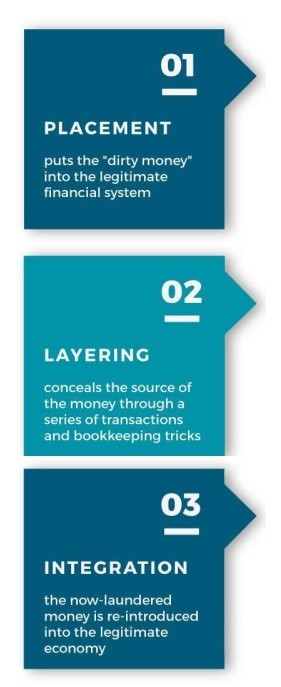AML/CFT Anti-Money Laundering Compliance & Combating Financing Terrorism Service
We help individuals and businesses maintain compliance with evolving Anti-Money Laundering and Combating the Financing of Terrorism (AML/CFT) standards, responding to global efforts to strengthen these processes. Governments are implementing measures to safeguard their financial systems from the risks of financial crimes, making it imperative to adhere to these evolving standards to avoid penalties and legal consequences.
AML/CFT Regulatory Alignment in Qatar
Ministerial Mandate
Ministerial Decision No. (41) of 2019 enforces Law No. (20) of 2019, focusing on AML/CFT in line with international standards.
Challenges in Compliance
Evolving Regulations: The ever-changing regulatory landscape and stricter AML rules present challenges for financial institutions and Designated Non-Financial Businesses and Professionals (DNFBPs).
Our AML/CFT Services
HLB AG in Qatar (Antonio Ghaleb and Partner CPA), offers consultancy services for developing policies and procedures, risk based approach, and independent assessments of AML, CFT and Sanctions Compliance Frameworks across various sectors.
Our Expertise
Our team that is CAMS certified specializes in developing, implementing and enhancing compliance frameworks for a range of sectors, including Exchange Houses, Banking, Insurance and other DNFBPs.
Key Elements of Qatar's AML/CFT Regulations
- Align with Financial Action Task Force (FATF) recommendations.
- Statutory obligations include risk recognition and assessment, due diligence, appointment of a compliance officer, establishment of management systems, controls, policies, procedures and maintenance of suspicious transaction indicators.
Qatar's AML/CFT Regulatory Framework
Relevant Laws:
- Law No (20) of 2019: Addresses money laundering and terrorism financing, simplifying AML/CFT obligations.
- Decision No. (95) of 2019: Monitors auditors' compliance with AML/CFT.
- Minister of Commerce and Industry (MOCI) Decision No. (48) of 2020: Promulgates AML/CFT Rules for legal auditors, precious metals/stones dealers, trust and company service providers.
- Executive Regulations (41) of 2019: Focus on countering money laundering, terrorist financing and financing illegal organizations.
NAMLCFTC (National Committee)
- Oversees Qatar's national risk assessment process.
- Assesses money laundering and terror financing risks in line with Financial Action Task Force Standards.
Sectors Governed by Regulations
- Qatar Central Bank's and QFCRA's AML/CFT regulations apply to:
- Banks, finance companies, exchange houses.
- Insurance companies, agencies, brokers.
- Securities and commodities brokers, dealers, advisors, investment managers.
- Other financial institutions (FIs).
- Designated Non-Financial Businesses and Professions (DNFBP).
Ensuring Compliance
- Financial Institutions and DNFBPs must maintain risk identification and assessment analyses.
- Diverse models and methodologies can be employed based on business nature and size.
- DNFBPs like auditors, lawyers and precious metals/stones dealers must maintain AMKL/CT policies and procedures per the Ministry of Commerce and Industry and QFCRA.
Professional & Experienced AML/CFT in Qatar
We offer independent assessments of Anti-money Laundering, Combating the Financing of Terrorism and Sanctions Compliance Frameworks across multiple sectors at HLB AG (Antonio Ghaleb and Partner CPA).
WHY CHOOSE US?
- Deep understanding of Qatar’s regulatory landscape and international AML/CFT standards.
- AML Certified professional staff that is competent and up to date with all the regulatory and compliance requirements and continuous developments.
- Expertise in conducting comprehensive risk assessments and policy development.
- Proactive approach to preventing financial crimes and mitigating regulatory risks.
- Ongoing support, training, and guidance to ensure sustainable compliance frameworks.
Frequently Asked Questions
Does my business need AML/CFT compliance services?
Yes, if your business is in financial services, real estate, or other regulated sectors, AML/CFT compliance is mandatory to meet legal obligations and prevent financial crimes.
What does an AML/CFT compliance framework include?
It includes risk assessments, internal policies, customer due diligence procedures, transaction monitoring, and reporting mechanisms.
What are the risks of non-compliance?
Non-compliance can lead to significant fines, legal penalties, reputational damage, and potential business restrictions.
Do you offer AML/CFT training for staff?
Yes, we provide comprehensive training to help employees understand compliance obligations and effectively identify suspicious activities.
Anti-Money Laundering Compliance Advisory

Frequently Asked Questions – AML/ CFT Compliance Services
1. What Are Relevant Laws Of Qatar On AML And CFT?
Law: Law No (20) of 2019 on combatting money laundering, and terrorism financing, clarifying, and simplifying AML/CFT obligation.
Decision No. (95) of 2019, under the MOCI Companies Affairs Department, is responsible for monitoring the compliance of the auditors with the AML/CFT
Decision of the Minister of Commerce and Industry (MOCI) No. (48) of 2020 promulgating AML/CFT Rules for legal Auditors, Dealers in Precious Metals or Precious Stones and Trusts and Company Service Providers
Executive Resolution: Executive Regulations (41) of 2019 for a on countering money laundering crimes, combating terrorist financing and financing illegal organizations
2. What Is NAMLCFTC?
The National Committee for Combating Money Laundering and the Financing of Terrorism and Illegal Organizations (NAMLCFTC) oversees the national risk assessment process. Qatar identifies and assesses the money laundering and terror financing risks it faces, in line with its obligations under the Financial Action Task Force Standards.
3. What Sectors Are Governed By The Qatar Central Bank’s And QFCRA’s AML / CFT Regulations?
The below-given sectors/ individuals need to comply with the AML/ CFT regulations;
-
- Banks, finance companies, exchange houses,
- Insurance companies, agencies, and brokers
- Securities and commodities brokers, dealers, advisors, investment managers
- Other financial institutions (FIs)
- Designated Non-Financial Businesses and Professions (DNFBP)
4. What Are The Main Elements Of The Qatar’s AML / CFT Regulations?
All the requirements of the Financial Action Task Force (FATF) recommendations of 2012 and its methodology of 2013 are included in the AML Law.
The minimum statutory obligations of supervised institutions are;
- To recognize, evaluate ad understand risks
- Carry out required due diligence work
- To appoint a compliance officer to fulfill the needs of the relevant Supervisory Authority
- To ensure that the required management and information systems, internal controls, policies and procedures to mitigate risks are in place
- To ensure that the indicators to recognize suspicious transactions are in place
- To maintain adequate records
5. How Does An Organization Ensure That It Is Compliant With The Qatar’s AML And CFT Regulatory Requirements?
Financial Institutions and DNFBP are required to “maintain a risk identification and assessment analysis with its supporting data.” They can make use of diverse models or methodologies to analyze risk, based on the nature and size of their businesses.
Designated Non-Financial Businesses and Professions such as auditors, lawyers and Dealers in precious metals or precious stones are required as per the Ministry of Commerce and Industry and QFCRA to maintain an adequate AMKL/CT policies and procedures
The best option would be to contact a consultancy to ensure you are compliant with the AML/ CFT regulations. Antonio Ghaleb and Partner CPA jointly with HLB HAMT works as a consultant to conduct independent assessments of Anti-money Laundering, Combating the Financing of Terrorism & Sanctions Compliance Frameworks across multiple sectors.

Want to speak to an industry expert?
Report Title (PDF, 9MB)Our expertise
Financial advisory
Legal services
Management consulting
Risk advisory
Technology advisory






